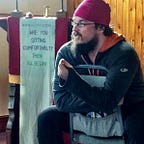Is Friction Stopping You Winning at Life?
We each start with a notional number of hours in our lives. And at any one time there is a number of hours in the future of our lives. This isn’t a fixed number. And it isn’t a number of which we can be certain. But it’s a number we can guess at.
“Winning at life” is a commonly used phrase, and it’s used jokingly. But while life is not a competition with others or, indeed, with oneself, the idea makes a certain amount of sense.
To “win at life” in this sense might mean to fill the greatest number of those remaining hours with things that a person finds meaningful or enriching.
The “game of life” then becomes a complex but significant endeavour. Yes, extending the number of hours of life in front of us matters. And yes, ensuring that as many of those hours are meaningful and enriching as is possible in the context of where we are right now is also worthwhile. Indeed the complex balance of these, and the interplays of altruism, self-awareness, negotiation, investment, and selfishness to which they give rise create a very textured fabric.
But these considerations raise more simple, albeit it often hard, questions and calls to action for us. In addition to this complexity, there is a frame of reference here that puts many things in life into sharp focus.
Many of the activities in which we engage have the practical effect of stealing time from us. A key part of the game of life is to minimise this daily robbery.
Of course there are areas where this is complex. even the most bullshit of bullshit jobs enables many of us to do things with our non-working time we could not otherwise do — and the series of social negotiations involved in changing the way society remunerates tasks would involve many of us in levels of activity that do not justify anything other than carrying on — even if we extend the calculus of what is “meaningful” to us to knowing we are participating in something larger than ourselves, which will reward others in the future.
But some things are simple, and while minimising them is hard, if we can identify them, they may repay the work we put into removing them.
The simplest example of a thief of time and enrichment and meaning and opportunity in many of our lives is friction.
The additional effort and time we put into tasks that should and could be more straightforward, on a daily basis, steals hours from all of us — every day. Of course, friction is not an equitable thief. Many of the structures in society mean that the majority of people experience less friction than others, because systems are geared to work more smoothly for them than others.
Friction steals meaningful time in two key ways.
First, friction steals time itself — when software is overly complicated, or a recipe is too fiddly, or hanging your clothes to dry without creasing is a faff, these things take actual time that you can’t use for something else.
Second, friction steals opportunity by exhausting us — even if we have the time to do something else, we only have a very few hours in the day when we function at our best. Having to struggle through processes which are exhausting or illogical or unnecessary can sap that precious resource so when we need it to, say, study a language or spend quality time with a loved one or pursue something meaningful to us, we can’t. And over time all those things we were unable to pursue catch up with us as the power of compunding takes hold.
This is an infinitely complex topic, and one that may repay considerable effort, but it raises helpful framing questions:
- What gives my life meaning and enrichment?
- Are there things I encounter on a daily basis which steal meaningful and enriching time from me?
Of those things:
- Are some actually part of complex equations, which might actually be worth exploring so that I understand that many of the things that fell as though they don’t contribute to meaning in my life actually do?
- Are some of the things that genuinely steal meaningful time from me things I am in a position to minimise now that I have identified them?
If the answer to that final question is yes, think about time spent exploring and implementing ways of eliminating those things — whether they are overly complex systems (like how you keep your journal, or manage your bills, or your passwords), or time spent making choices about options that are actually equal and could be sorted with a dice roll — as an investment, and consider what the return on that investment might be.
If you’re interested in questions like these, and how to live a more creative life, do sign up for my very non-spam and infrequent newsletter that offers creative tips and things of interest.
